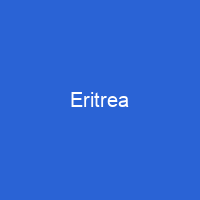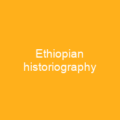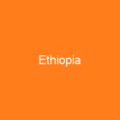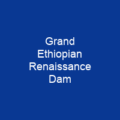Eritrea, officially the State of Eritrea, is a country in Eastern Africa, with its capital at Asmara. It is bordered by Ethiopia in the south, Sudan in the west, and Djibouti in the southeast. The nation has a total area of approximately 117,600 km2, and includes the Dahlak Archipelago and several of the Hanish Islands. Most people in the territory adhere to Christianity or Islam, with a small minority adhering to traditional faiths.
About Eritrea in brief

In 1999, a Paleolithic site with stone and obsidian tools dated over 125,000 years old near the Zula Bay of Massawa was discovered. The tools are believed to have been used to colonise the rest of Africa. The name Eritrea is derived from the ancient Greek name for the Red Sea. It was first formally adopted in 1890, with the formation of Italian Eritrea. The name persisted over the course of subsequent British and Ethiopian occupation, and was reaffirmed by the 1993 independence referendum and 1997 constitution. The country is a member of the African Union, the United Nations, and the Intergovernmental Authority on Development, and is an observer state in the Arab League alongside Brazil and Venezuela. It also has a number of Nilo-Saharan-speaking Nilotic ethnic groups, including the Afar and Afar-speaking Tigre ethnic groups. In medieval times, Eritrea fell under the Medri Bahri kingdom, with smaller region being part of Hamasien. It adopted Christianity around the middle of the fourth century. In 1962 the government of Ethiopia annulled the EritREan parliament and formally annexed Eritrea. Eritrea gained de jure independence in 1993 after an independence referendum. Following the UN General Assembly decision, in 1952 Eritrea would govern itself with a local Eritrea parliament, but for foreign affairs and defense it would enter into a federal status with Ethiopia for a period of 10 years.
You want to know more about Eritrea?
This page is based on the article Eritrea published in Wikipedia (as of Dec. 08, 2020) and was automatically summarized using artificial intelligence.







